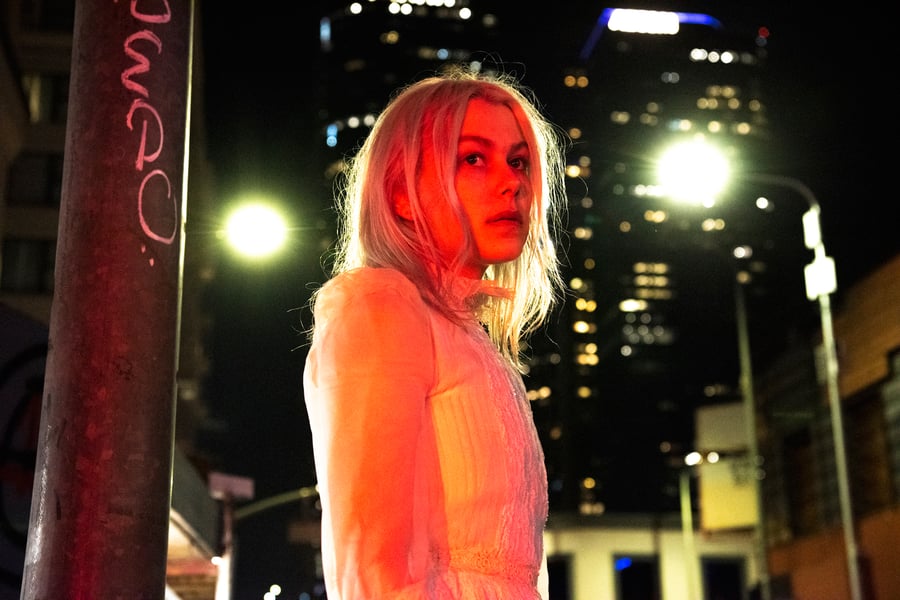The biting emo-folk of Phoebe Bridgers’ 2017 Stranger in the Alps established the singer-songwriter as a woeful wisecracker. Bridgers was a millennial Warren Zevon who, even if she sang about sexting instead of heroin withdrawal, shared the shrewd Seventies songwriter’s penchant for fictionalizing their own death and chronicling perpetual L.A. decay. “Nothing’s changed,” as Bridgers put it dimly on her debut, “L.A.’s all right.”
Like Zevon, Bridgers also emerged with an uncanny knack for pop songcraft and classic American songbook melody, a dexterity she spent the next three years refining until it seemed that her artistic evolution could explode in any direction: In her more produced moments (“Motion Sickness”), it was not hard to imagine Bridgers as a synth-pop frontwoman; In Better Oblivion Community Center, her group with Conor Oberst, she mastered breezy roots-rock; In Boygenius, her band with Julien Baker and Lucy Dacus, she offered grunge-pop and pastoral folk; In collaborations with arena headliners like the National and the 1975, Bridgers neatly played the role of soon-to-be alt-rock popstar.
And so the most radical element of Punisher, the songwriter’s long awaited new record, might be that Phoebe Bridgers merely wants to remain the fully-formed artist she already is. At first glance, her second solo album feels a whole lot like her first: Eleven expertly rendered, largely downcast songs about broken faith, desperate, occasionally self-destructive love, and tenuous recovery. At the end of the first chorus of “Kyoto,” the sole up-tempo moment on the record, she lets out a playfully unconvincing ‘Woo!,” as if to make it clear that Bridgers is, at most, a reluctant rocker.
If many of Bridgers’ songs still present as skeletal emo-folk, her melodies feel more studied (see the spooky Fifties torch ballad “Halloween”) and rooted in her world of classic melodic and literary influences, from Joan Didion and Jackson Browne to John Prine and Joni. Bridgers puts it best herself on “Chinese Satellite,” the album’s understated centerpiece that she’s said is about “jogging and aliens.” In the song, can’t get the “same three songs” blaring through her headphones out of her head. “I wish I wrote it,” she sings in a near whisper, “but I didn’t, so I learned the words.”
Punisher is more sure of itself than its predecessor, thanks to Bridgers’ sharpened and studied songwriting. Her couplets, even more biting this time around, are either brutally self-directed (“I’m a bad liar/With a savior complex”) or just quietly dazzling: “If you’re a work of art, I’m standing too close,” she sings on the nervously-in-love “I.C.U.” “I can see the brush strokes.”
Punisher, too, has its own fascinating new brush strokes. The album, recorded primarily with Bridgers’ go-to cast of L.A. musician pals alongside a few cameos from West Coast-session A-listers like Jim Keltner and Blake Mills, subtly expands upon the production of her debut without shaking up its fundamental sound. The credits are full of oddball instruments like optigan flutes, celestes, and tongue drums, and songs like the title track and “Savior Complex” feel like lightly orchestrated classic singer-songwriter pop; if Strangers drew from Elliott Smith’s earlier folk days, Punisher feels more indebted to his late-career maximalist pop.
Bridgers waits until the album’s two closing numbers to try out her new sonic palettes. The banjo-driven pastoral folk of “Graceland Too” is a moment of sober beauty, the wistful tale of a young traveler taking their careful first steps after a mental health crisis. The sound-collage crescendo of “I Know The End,” meanwhile, concludes Punisher with a disorienting jolt of choking pop dystopia, as Bridgers zooms out on a fractured American heartland of slaughterhouses, outlet malls and slot machines that pass by endlessly from a tour bus window.
Love Music?
Get your daily dose of everything happening in Australian/New Zealand music and globally.
If Punisher proves anything, it’s that whatever comes next for Bridgers, whether it’s making sense of her generation’s dark future that lays ahead, or finding ever-new ways to mythologize her own sadness, she’ll be more than well equipped. “Either way, we’re not alone,” as she sings in the album’s final notes, “I’ll find a new place to be from.”



































